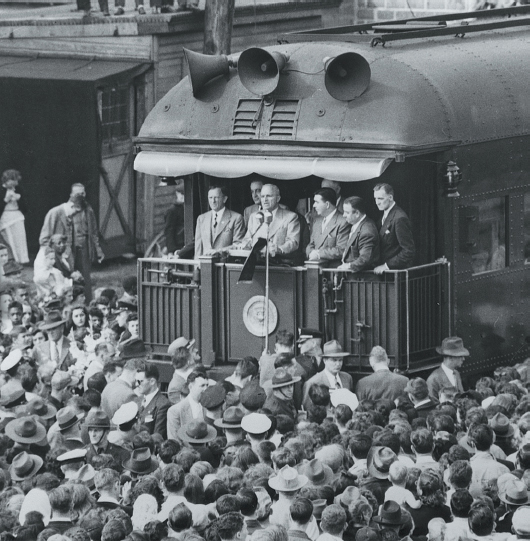Why did Truman have limited success in implementing his domestic agenda?
Printed Page 789

Figure false: Truman’s Whistle-Stop Campaign
Figure false: Harry Truman rallies a crowd from his campaign train in Bridgeport, Pennsylvania, in October 1948. As he campaigned across the country, supporters often shouted, “Give ’em hell, Harry.” Truman’s support for civil rights cost him four southern states but helped him win votes from liberals and blacks. Truman Library.
Figure false: VISUAL ACTIVITY
Figure false: READING THE IMAGE: This photo was taken one month before the election. Why might his opponent’s campaign have dismissed the importance of these large crowds in support of Truman?
Figure false: CONNECTIONS: President Truman was under attack by the Republicans and could not enact the Fair Deal. Almost everyone thought he would lose the election. Why do you think the American people responded so well to his campaign? In what ways have presidential campaigns changed since Harry Truman’s time?
REFERRING TO THE CIVIL WAR GENERAL who coined the phrase “War is hell,” Truman said in December 1945, “Sherman was wrong. I’m telling you I find peace is hell.” Challenged by crises abroad, Truman also faced shortages, strikes, inflation, and other problems as the economy shifted to peacetime production. At the same time, he tried to expand New Deal reform with his own Fair Deal agenda of initiatives in civil rights, housing, education, and health care — efforts hindered by the wave of anti-Communist hysteria sweeping the country.
CHRONOLOGY
1946
- – Postwar labor unrest.
- – President’s Committee on Civil Rights is created.
- – Employment Act.
- – Republicans gain control of Congress.
1947
- – Mendez v. Westminster.
1948
- – Truman orders desegregation of military.
- – American GI Forum is founded.
- – Truman is elected president.
1950
- – Senator Joseph McCarthy claims U.S. government harbors Communists.